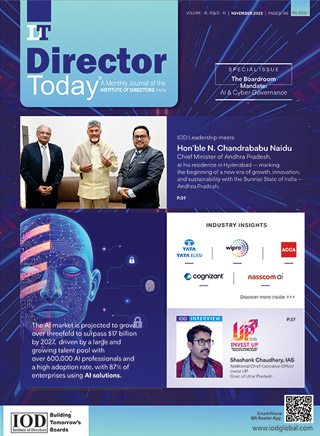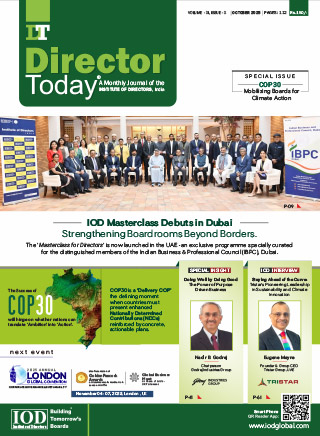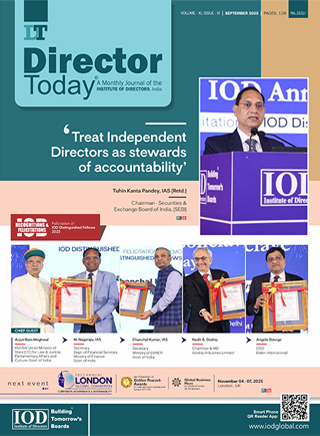Evolving Roles of Independent Directors

Changing Expectations, Expanding Responsibilities and Future Developments
Contemporary businesses and boards are confronted with multiple, complex, and interrelated challenges, risks, and existential threats. What could this mean for independent directors, their roles and responsibilities, how these may evolve, and their induction and acclimatisation? How might attitudes towards them and expectations of them change? What role should they play on board committees, and how will they be affected by developments in the contexts within which they operate? From whom might they obtain relevant advice and support?
Many executive director roles have become more demanding and time-consuming. Some stakeholder groups are fragmenting, and their views on issues are polarising. As risks and threats multiply, so do challenges and associated opportunities. Some boards are running out of bandwidth to recognise and handle developments and events that could either take them out and/or transform them and their prospects. How might independent directors help and make a greater contribution to the governance of contemporary organisations?
With many executive colleagues focused on internal and corporate issues, independent directors can contribute balance through their engagement with, and experience of, the external and international context within which companies operate.
Independent directors can bring greater diversity and rigour to the work of a board and make it more representative of the stakeholder interests a company is seeking to serve. Care needs to be taken to ensure that diversity is sought across a range of factors and not just the 'usual suspects' such as gender and ethnicity. Nomination and selection committees can favour those with similar social, educational, and experience backgrounds to themselves rather than seek the diversity of thinking and perspective that might be required to address evolving issues.
Changing nature of boardroom issues
The business environment is becoming more uncertain and insecure. As interconnected global risks and existential threats multiply, many independent directors are endeavouring to better understand them, their impacts, and possible responses. They feel their roles are changing and are now more demanding. The issues many boards are concerned with are more complex, evolving, and sometimes unprecedented. They may be new for all board members and those who advise them. More thinking time by each director might be required between meetings.

Past assumptions may no longer apply. When matters encountered previously arise again, the circumstances are often different. There may be additional factors to take into consideration. Lessons from previous experiences might not be applicable. What other companies have done, or are planning to do, may not be relevant to the situation a company is in. The impacts of wider trends such as global warming can be context-specific. Some locations may be much more badly affected than others by a crisis or extreme weather event.
Government responses to common challenges and shared risks and threats, and those of regulators, local authorities, regional utilities, and infrastructure and service providers, can also vary. The consequences of general measures and/or guidance for individual companies may differ as well. Rather than adopt a standard corporate policy or response and sit back, an increasing number of decisions must often be taken on the situation and circumstances of an individual case. Inter-related and inter-dependent issues may have to be considered together.
Changing roles and responsibilities
As the world continues to fragment into groupings with very different perspectives, beliefs, and ambitions, it may not be possible for a head office unit or international headquarters to develop standard corporate policies that apply to all jurisdictions. More of them may require modification, and some may have to become country-specific. Divisional directors and directors of national operating companies can find themselves having to develop tailored policies rather than adopt general ones that have been developed and approved elsewhere.
Some directors might welcome the extra responsibility. Others may feel exposed. More issues are being encountered that cannot be so easily delegated to a particular function, specialist, or business unit. When most aspects of corporate activities and operations are or might be affected by an external trend, collective responses could be required. Organisational silos and corporate boundaries can inhibit cross-function, multi-disciplinary, and international collaboration. Difficult and holistic issues are increasingly being referred to the board.
Board members who have hitherto exercised top down leadership and control may feel more isolated than those who have adopted a more participative and listening approach. Directors who have been adept at playing boardroom politics might find fewer clearly formulated and confidently articulated views to align with. Different sides, or even any position, may be difficult to determine. Independent directors looking to increase a portfolio of board appointments can find that new ones are more demanding than those previously experienced.
Obtaining relevant advice and support
Within corporate organisations, many experts and professionals are also encountering a wider range of issues for which precedents and guidance are lacking or may be inappropriate. Executive directors and departmental heads encounter unfamiliar issues or aspects that have not been encountered before. Some boards experience limits to what they feel capable of handling. Outside of the boardroom, sources of authoritative advice may be difficult or even impossible to locate. When novel challenges arise, potential support can often be hard to find.
Calling for more thought and seeking advice, which might once have seemed like responsible suggestions, may seem unhelpful when inspiration is lacking and relevant expertise is difficult to determine. Some who have hitherto sought and accessed appropriate advice and counsel as and when required are finding they must now think for themselves or turn to expensive consultants who might be struggling to keep one step ahead of their clients and handle the many different forms and ways in which an issue might emerge and evolve.
Not everyone who is used to 'doing things' such as turning up and simply voting with colleagues finds it easy to exercise individual thought. Reflection makes some people uncomfortable. After years of swimming with the tide and/or reacting, and with fellow board members less confident and searching for suitable responses, directors may find themselves 'on their own' without a corporate view to express. Having to make independent judgements and formulate an opinion becomes a reality rather than a theoretical directorial requirement.
Changing attitudes towards board appointments
With less certainty, fewer relevant lessons from the past to rely upon, and more colleagues reluctant to utter an opinion or provide support, a directorship may become more of a burden. Some directors can feel overboarded. They may both want and act to shed certain roles, further increasing the pressure on their colleagues. Remaining directors might reflect on how their workloads and exposure to risk and uncertainty have increased. Existing board portfolios might need to be reviewed and reduced to avoid the risk of becoming overloaded.
Preparing for possible eventualities and scenarios by seeking new directors could result in an overly large and unwieldy board, assuming suitable candidates are forthcoming. Potential board members might be difficult to identify and select. How does one recognise possible candidates when the future is so uncertain and if the role becomes more onerous? As legal, regulatory, and compliance duties, responsibilities, and exposure increase, more individuals may prefer to give advice and/or consult rather than seek additional board appointments.
Candidates for independent director roles have further areas of uncertainty to contend with when undertaking due diligence investigations. These include how an entity could be affected by various risks and existential threats and how a board might respond. The frequency of certain scenarios requiring additional board meetings may also increase. Their agendas could include scaling down or shedding high negative externality activities, collaboration, consolidation and rationalisation negotiations, and/or a change of direction and/or purpose.
Obtaining a first appointment
A first independent director appointment often comes from a person one knows. Those attracted to the role should make members of their network aware of their interest. To justify their consideration, they might explain what is unique, special, or different about them and what they could contribute that others cannot. Nomination committees may look for those who could fill a perceived deficiency or gap within an existing boardroom team, as well as having the breadth to contribute to the wide range of issues that could come before a board.
Before accepting an offer to become a director, a prudent candidate might want to meet other independent directors and ask them about the company, its management and board, and current issues. The time likely to be required could be a multiple of that indicated for board meeting attendance and preparation. A letter of appointment should provide clarity on matters such as access to information, available support, directors and officer's insurance (DOI) cover, and whether a board member will be able to accept and undertake other directorial roles.
Evident vulnerabilities have increased the importance of due diligence ahead of a board appointment. Differences in the financing of public and private companies and in the conduct of their boards are becoming less clear-cut. In some jurisdictions, companies are delisting. More funds invest in private companies, which may raise money without going public. Aspects of governance associated with a listing may be introduced ahead of an IPO. During periods of transition, as changes are phased in, situations can quickly alter and evolve.
Director induction and acclimatisation
When so much is changing and new and the future is so uncertain, inducting new directors and preparing them for multiple future possibilities and scenarios can be difficult to arrange. Beyond introductions to the company concerned, directorial duties and responsibilities, corporate governance arrangements, and board practices, the individualised induction programs of some companies largely leave it to new board members to take the lead in their own development and also commit to staying current, engaged, and relevant.
Newly appointed directors may require some time to settle into their new roles. Their effectiveness at challenging a CEO and executive colleagues can be influenced by their prior experience and what they learn from others during this period. If existing and long-standing independent directors actively question and probe, they may be more likely to follow suit. In time and after reassuring comments and neutralising or unhelpful responses, certain directors may become less curious and/or willing to investigate and scrutinise. Certain responses from a chair or key members of the board can discourage further questions or interventions.
Early in their appointments and before they 'go native', directors can often bring a fresh perspective on the meaning, relevance, and implications of purpose and contemporary areas of stakeholder concern. Within the cohort of independent directors, there should be sufficient experience of a company and its board to hold executive directors to account. Independent director appointments should ideally be planned to ensure a mix of more and less experienced board members. Those who have served longer and on multiple boards without being over boarded may be better able to control management and contain negative board practices.
Independent directors and board committees
When considering where independent directors could be especially helpful, boards sometimes overlook the contribution of committees to their overall effectiveness. Chairs of board committees that subject certain areas to greater scrutiny might feel especially exposed. The experience and knowledge of directors appointed with a view to their service on one or more committees may become dated and not reflect current issues and changing stakeholder views. A more independent element and fresh thinking might be beneficial on certain committees.
Board committees can give directors access to a wider range of inputs and provide a link between board and management. They can also play in role in helping to develop board policies, ensuring effective performance in certain areas, and monitoring and/or reviewing compliance. How aware and representative of different stakeholder groupings and interests are current board and committee members? Is committee composition reviewed, and account taken of gaps and evolving requirements when independent directors are appointed?
The personal qualities of individuals can be more important than their categorisation when considering composition. Matters for which a board should retain responsibility, address and be held accountable should not be delegated. Ad-hoc and permanent committees should advise and support the work of a board without compromising its directorial oversight. They might enable a wider range of experiences and skills to be harnessed. Should there be a board committee for sustainability, governance, ESG, green audit and/or artificial intelligence?
Independent directors and contextual developments
Some executive directors preoccupied with departmental responsibilities may overlook external, geopolitical and international developments. Independent directors who think for themselves and exercise independent judgement can bring an outsider view and contextual awareness to a board. They could monitor executive understanding of external trends, events, global risks and existential threats, how they are taken into account, and also consider the interests of broader stakeholder groups, when commenting, deliberating and taking decisions.
With many executive colleagues focused on internal and corporate issues, independent directors can contribute balance through their engagement with, and experience of, the external and international context within which companies operate. They may offer greater appreciation of geopolitical developments and be alert to the fracturing of the international system, and the emergence of polarised views, new confrontations, contending positions, and evolving great power rivalries. Might a board also benefit from additional insight, knowledge and/or experience of science and technology challenges, direction and governance?
In view of what they may contribute, how might independent directors become more engaged in board deliberations? Where their experience and expertise are relevant, how could they be encouraged to participate more in boardroom discussions? Authoritarian leaders with dictatorial and expansionist leanings can undermine order and stability. Independent directors could be asked to monitor warning signs and/or potential strategic risks, such as a threat to openness and democracy, or the possibility of climate and other trends leading to disputes.
Possible evolution of independent director roles
Given the emergence of contending visions of the future and the neo-imperialist ambitions of certain authoritarian regimes, what alert mechanisms could boards put in place? Connectivity can lead to dependency, which if exploited may lead to conflict. What role could independent directors play in assessing risks, monitoring ethical conduct, evolving issues, the emergence of existential threats, or the adequacy of accountability and transparency, and/or determining when and in what form collaboration and alerting stakeholders might be appropriate?
Given the prevalence of negative externalities, the lengths to which many companies go to avoid or exploit sanctions regimes aimed at illegal activities, and widespread willingness to trade with perpetrators of aggression, some may wonder what role ethics plays in contemporary business relations. In place of absolutes, standards, and corporate statements of values, might more future boards 'put business first', display greater fluidity, and be more open to variety according to project imperatives, customer requirements, or individual cases?
Confronting existential threats can require pragmatism, flexibility, and a willingness to cooperate across ideological divisions on an issue-by-issue basis, according to situation and circumstances. What role should independent directors play in monitoring corporate conduct and values and acceptable, ethical, and/or moral behaviours? How might one assess what possible independent directors could bring to the work of a board and their potential value addition to a business? While not a panacea, their contribution should be actively considered.
Author

Prof. Colin Coulson-Thomas
Director-General of IOD India for UK and Europe operations
Prof. (Dr) Colin Coulson-Thomas, President of the Institute of Management Services and Director-General of IOD India for UK and Europe operations. He has advised directors and boards in over 40 countries.
Owned by: Institute of Directors, India
Disclaimer: The opinions expressed in the articles/ stories are the personal opinions of the author. IOD/ Editor is not responsible for the accuracy, completeness, suitability, or validity of any information in those articles. The information, facts or opinions expressed in the articles/ speeches do not reflect the views of IOD/ Editor and IOD/ Editor does not assume any responsibility or liability for the same.

 Quick Links
Quick Links
 Connect us
Connect us




 Back to Home
Back to Home






























